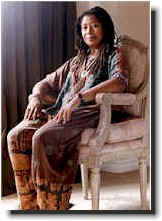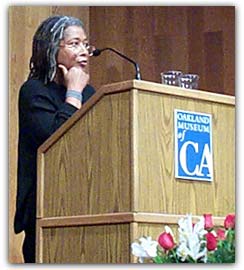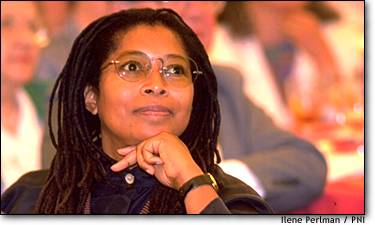 Alice
Walker
Alice
WalkerAuthor
FemmeNoir
A Web Portal For Lesbians Of Color
 Alice
Walker
Alice
Walker"I am bisexual. I just live my life. I don't think I have to phone in and tell everybody." --Alice Walker from February 1996 edition of Essence
In full ALICE MALSENIOR WALKER (b. Feb. 9, 1944, Eatonton, Ga., U.S.), American writer whose novels, short stories, and poems were noted for their insightful treatment of black American culture. Her novels focused particularly on women, most notably The Color Purple (1982; film, 1985), which won a Pulitzer Prize in 1983.
 Her
father's great-great-great grandmother Mary Poole was a slave
forced to walk from Virginia to Georgia with a baby in each arm.
Her mother's grandmother Talluhah was mostly Cherokee Indian.
Alice is deeply proud of her cultural inheritances.
Her
father's great-great-great grandmother Mary Poole was a slave
forced to walk from Virginia to Georgia with a baby in each arm.
Her mother's grandmother Talluhah was mostly Cherokee Indian.
Alice is deeply proud of her cultural inheritances.
Walker was eighth and last child of Willie Lee and Minnie Lou
Grant Walker, who were sharecroppers. When Alice Walker
was eight years old, she lost sight of one eye when one of her
older brothers shot her with a BB gun by accident. In high
school, Alice Walker was valedictorian of her class, and that
achievement, coupled with a "rehabilitation scholarship" made it
possible for her to go to Spelman, a college for black women in
Atlanta, Georgia. After spending two years at Spelman, she
transferred to Sarah Lawrence College in New York, and during
her junior year traveled to Africa as an exchange student. She
received her bachelor of arts degree from Sarah Lawrence College
in 1965.
After finishing college, Walker lived for a short time in New York, then from the mid 1960s to the mid 1970s, she lived in Tougaloo, Mississippi, during which time she had a daughter, Rebecca, in 1969. Alice Walker was active in the Civil Rights Movement of the 1960's, and today she is still an involved activist. She has spoken for the women's movement, the anti-apartheid movement, for the anti-nuclear movement, and against female genital mutilation.
In August 1963 Alice traveled to Washington D.C. to take part in the March on Washington for Jobs and Freedom. Perched in a tree limb to try to get a view, Alice couldn't see much of the main podium, but was able to hear Dr. King's I Have A Dream address.
 She also
began teaching and publishing short stories and essays and her
first book of poetry, Once (1968). Her first novel,
The Third Life of Grange Copeland (1970), traced a family's
attempt to conquer a kind of emotional slavery that existed
across three generations. In 1973 she published In Love &
Trouble: Stories of Black Women and Revolutionary
Petunias & Other Poems before moving to New York to complete
Meridian (1976), a novel about a young woman in the
civil-rights movement.
She also
began teaching and publishing short stories and essays and her
first book of poetry, Once (1968). Her first novel,
The Third Life of Grange Copeland (1970), traced a family's
attempt to conquer a kind of emotional slavery that existed
across three generations. In 1973 she published In Love &
Trouble: Stories of Black Women and Revolutionary
Petunias & Other Poems before moving to New York to complete
Meridian (1976), a novel about a young woman in the
civil-rights movement.
Walker later moved to California, where, in 1982, she wrote perhaps her most popular novel, The Color Purple. Written in epistolary form and in black English vernacular, the book depicted a black woman's struggle for racial and sexual equality. She received the Pulitzer Prize in 1983 for The Color Purple.
After releasing a collection of essays, In Search of Our Mothers' Gardens (1983), and a collection of poetry, Horses Make a Landscape Look More Beautiful (1984), she co-founded Wild Trees Press (1984-88). Her later novels included The Temple of My Familiar (1989) and Possessing the Secret of Joy (1992). Walker also wrote juvenile literature and critical essays on such women writers as Flannery O'Connor and Zora Neale Hurston.
In 1996 Alice published "The Same River
Twice: Honoring the Difficult" in which she describes
through essays and journal entries the loss of her beloved
mother, the break-up of her 13-year relationship with Robert
Allen, her own battle with lyme disease and depression, and her
awakening sense of bi-sexuality. The book also contains Alice's
own version of the screenplay to "The Color Purple" and
many of her notes and remembrances from the making of her novel
into film.
 The
next year Alice published another non-fiction title,
"Anything We Love Can Be Saved: A Writer's Activism", with
more essays inspired by her ever-expanding political activism.
From the civil rights movement to the anti-nuclear movement, the
environmental movement, the women's movement (she continues as a
contributing editor to Ms. Magazine), and most recently
the movement to protect indigenous people, their cultures and
natural environments, Alice remains an outspoken activist on
issues of oppression and power; championing the victims of
racism, sexism and military-industrialism and seeking to
preserve our natural heritages.
The
next year Alice published another non-fiction title,
"Anything We Love Can Be Saved: A Writer's Activism", with
more essays inspired by her ever-expanding political activism.
From the civil rights movement to the anti-nuclear movement, the
environmental movement, the women's movement (she continues as a
contributing editor to Ms. Magazine), and most recently
the movement to protect indigenous people, their cultures and
natural environments, Alice remains an outspoken activist on
issues of oppression and power; championing the victims of
racism, sexism and military-industrialism and seeking to
preserve our natural heritages.
In September 1998, Alice published "By the Light of My
Father's Smile". Her first novel in six years, the book
examines the connections between sexuality and spirituality. The
multi-narrated story of several generations explores the
relationships of fathers and daughters. As in previous fiction,
Alice weaves back and forth through time and individual
perspectives, her characters seeking redemption, forgiveness and
peace. The book contains sexually explicit imagery and erotica
and may not be appropriate for younger readers.
 Among her
numerous awards and honors are the Lillian Smith Award
from the National Endowment for the Arts, the
Rosenthal Award from the National Institute of Arts &
Letters, a nomination for the National Book Award, a
Radcliffe Institute Fellowship, a Merrill Fellowship,
a Guggenheim Fellowship, and the Front Page Award
for Best Magazine Criticism from the Newswoman's Club of New
York. She also has received the Townsend Prize and a
Lyndhurst Prize.
Among her
numerous awards and honors are the Lillian Smith Award
from the National Endowment for the Arts, the
Rosenthal Award from the National Institute of Arts &
Letters, a nomination for the National Book Award, a
Radcliffe Institute Fellowship, a Merrill Fellowship,
a Guggenheim Fellowship, and the Front Page Award
for Best Magazine Criticism from the Newswoman's Club of New
York. She also has received the Townsend Prize and a
Lyndhurst Prize.
Alice is a vegetarian, gardener, world
traveler and spiritual explorer. She lives in Mendocino,
California with her dog, Marley.
BIBLIOGRAPHY
Donna Haisty Winchell, Alice Walker (1992); Henry Louis Gates,
Jr., and K.A. Appiah (eds.), Alice Walker: Critical Perspectives
Past and Present (1993).
Copyright © 1994-99 Encyclopędia Britannica, Inc.
Harris,Jessica. "An Interview with
Alice Walker," Essence. July 1976, p.33.
Source:
http://www2.blackside.com/immaw/MediaInfo.asp?MediaID=9
http://www.luminarium.org/contemporary/alicew/
Bio courtesy the Alice Walker-Womanist Writer website
http://www.ipoet.com/ARCHIVE/BEYOND/Walker/Alice.html
http://wwwvms.utexas.edu/~melindaj/alice.html
http://wwwvms.utexas.edu/~melindaj/bio.html
Home